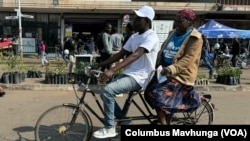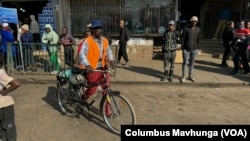Faced with a broken public transit system, poor road conditions, fuel shortages and low salaries, Zimbabwean authorities are urging citizens to cycle to work, ostensibly for health reasons and to promote a clean environment, as bicycles do not use fossil fuels.
Jacob Mafume, the mayor of Harare, said if Zimbabweans in greater numbers chose to cycle to work, there would be less congestion and fewer road accidents, among other benefits.
“Most of the health problems that we have in society now is that we are sitting all the time. We sit at work. We sit in the car, as we [drive] there. So it does not help as a society to be built on unhealthy practices,” Mafume said. “But also, it is also cheaper on the budget: People can focus on other issues like housing, education and even investment, if they are on bicycles. And also, it is environmentally friendly. It is less impact on our environment. And people would thank us later for this, as they will live to ripe old age in fitness.”
Ngoni Nyamadzawo, a part-time gardener in Harare’s affluent suburbs, cycles daily as a way to reduce costs to save his average salary of $150 a month.
“I see cycling as a saving measure. If I did not cycle, I would use $30 a month for transport,” Nyamadzawo said.
Segio Tarwirei works for a local NGO, Tree Knowers and Growers, which advocates for more trees. He cycles daily and encourages Zimbabweans to join him.
“Cycling has so many physical benefits,” he said. “Driving is not good for the environment as cars release dirt into the atmosphere. As an organization — of Tree Knowers and Growers — we encourage people to cycle. If I was using public transport, I would be paying $4 daily, at the end of the month it would be a lot of money, so cycling is good for health and the pocket.”
Tarwirei said he would like the city of Harare to rehabilitate cycling tracks, which have been neglected for years.
Mayor Mafume said he is aware of the dilapidated state of cycling lanes in the capital city.
“We are going to revamp them,” he said. “One of the issues that we have to do is to put a cycle track running across Harare Drive. Once we have a cycle track circling the city, then all the other cycle tracks can fit into Harare Drive.”
Harare Drive is the city’s longest road and circles Harare.







